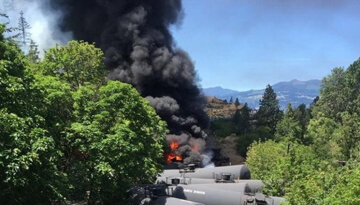Oil Trains in the Gorge
|
Public Hearing Tuesday Sept. 6th on Union Pacific Rail Expansion near Mosier, OR
|
From the HRVRC Board of Directors:
Only three months after an oil train derailed, spilled, and burned in Mosier on June 3rd, Union Pacific Railroad is
proposing to construct four additional miles of mainline track through the Columbia River Gorge National Scenic Area near Mosier, OR. This would allow more, longer trains to pass along communities in the Gorge. HRVRC is opposed to Union Pacific’s expansion proposal. While Mosier is in Wasco County, adding tracks in Mosier will lead to increased train traffic all along the Columbia River, including Hood River County.
The transportation of oil and other toxic substances by rail through the Columbia River Gorge threatens all of what we hold dear and strive to protect. It is one very bad land use decision. The derailment of oil cars in Mosier, clearly demonstrates how this continued dangerous action on the part of the fossil fuel and railroad industries has moved from looming threat to reality in the Gorge. The freakish part of this incident is not that it happened, but that it wasn’t a full-blown disaster. With our typical Gorge winds this incident could have incinerated our citizens, destroyed the town of Mosier and spread to forests, farms, decimated our National Scenic treasure and polluted our priceless natural resources. While the uncharacteristically windless day was so fortunate in one aspect, it was also one of the hottest days on record for early June. The confluence of an oil train derailment and record heat underscores the bigger threat of our fossil fueled warming climate. What an interconnected mess!
But if we are going to stop these oil trains to safe keep our Gorge and planet we must simultaneously pursue a number of actions big and small. They all count.
There is the obvious call for Union Pacific and other railway companies to rise to much higher safety standards and the need for more robust Federal and State safety oversight. This is where our citizen voice and public action is key. We must lobby our state and federal policymakers to impose actual, meaningful safety regulations on the private railways and halt oil transport by rail, particularly the unit trains carrying up to 120 cars. In the words of Mosier Fire Chief Jim Appleton, “THAT mode of transporting THAT fuel, or anything that dangerous, is INSANE!”
At the same time we must make a concerted effort to reduce our own consumption of fossil fuels and move toward clean and safe energy by changing how we do things. One of the key ways we can reduce our fossil fuel consumption and a warming climate is through wise land use planning. This means:
— Planning compact, vibrant urban areas with safe alternative modes of transportation to stores, community parks and neighborhoods, relying less on cars.
— Well-planned urban areas that prevent sprawl into farm and forest lands, which in turn sequesters carbon, especially in the orchard tree predominate Hood River Valley.
— Partnering with other environmental organizations, elected officials and individuals to promote wise land use decisions and prevent bad ones.
As one of Oregon’s oldest land use activist groups, HRVRC has fought our share of bad decisions over the years. We know that fighting the transport of volatile Bakken oil or any toxic substance by rail through the Gorge will require constant vigilance, courage and perseverance by many, but it is important that we act locally as well by making development decisions that reduce the demand for fossil fuels and encourage the production of clean energy.
